
The World Food Programme (WFP) is an international organization within the United Nations that provides food assistance worldwide. It is the world's largest humanitarian organization and the leading provider of school meals. Founded in 1961, WFP is headquartered in Rome and has offices in 80 countries. As of 2021, it supported over 128 million people across more than 120 countries and territories.
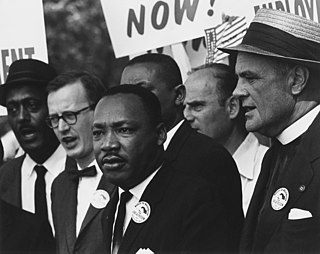
In politics, humanitarian aid, and the social sciences, hunger is defined as a condition in which a person does not have the physical or financial capability to eat sufficient food to meet basic nutritional needs for a sustained period. In the field of hunger relief, the term hunger is used in a sense that goes beyond the common desire for food that all humans experience, also known as an appetite. The most extreme form of hunger, when malnutrition is widespread, and when people have started dying of starvation through lack of access to sufficient, nutritious food, leads to a declaration of famine.
Famine relief is an organized effort to reduce starvation in a region in which there is famine. A famine is a phenomenon in which a large proportion of the population of a region or country are so undernourished that death by starvation becomes increasingly common. In spite of the much greater technological and economic resources of the modern world, famine still strikes many parts of the world, mostly in the developing nations.

The Mid Day Meal Scheme is a school meal programme in India designed to better the nutritional status of school-age children nationwide. The scheme has been renamed as PM-POSHAN Scheme. The programme supplies free lunches on working days for children in government primary and upper primary schools, government aided Anganwadis, Madarsa and Maqtabs. Serving 120 million children in over 1.27 million schools and Education Guarantee Scheme centres, the Midday Meal Scheme is the largest of its kind in the world.

Josette Sheeran is an American non-profit executive and diplomat who served in the United States Department of State. Sheeran serves as the seventh president and CEO of Asia Society since June 10, 2013. Sheeran was also the United Nations's Special Envoy for Haiti.

Freedom from Hunger is an international development nonprofit organization working in nineteen countries. Freedom from Hunger focuses on providing small loans and business education to poor women.

FEED is an American fashion company, founded by Lauren Bush-Lauren and Ellen Gustafson in 2007.

Mary's Meals, formerly known as Scottish International Relief (SIR), is a registered charity which sets up school feeding programmes in some of the world's poorest communities, where hunger and poverty prevent children from gaining an education. It was founded in 2002 and has grown from its first feeding operation of 200 children in Malawi, to a worldwide campaign, providing free school meals in hundreds of schools and feeding more than two million children daily. Mary's Meals is named after Mary, the mother of Jesus, by its founders, who were inspired by their Catholic faith, although the charity is not a Catholic organisation.
Purchase for Progress (P4P) is an initiative of the United Nations World Food Programme (WFP), involving over 500 partnerships, including Bill & Melinda Gates Foundation, the Howard G. Buffett Foundation, FAO, ACDI/VOCA, TechnoServe and others. Launched in September 2008 as a five-year pilot, P4P sought to explore programming and procurement modalities with the greatest potential to stimulate agricultural and market development in ways that maximized benefits to smallholder farmers. The program, largely developed by the eleventh Executive Director of the WFP, Josette Sheeran, arose as the WFP desired to purchase food in a way that was part of the "solution to hunger". These efforts are aligned with recommendations issued by the UN Committee on Economic, Social and Cultural Rights that call for an establishment of programs in support of socially vulnerable groups. and to the Zero Hunger Challenge launched by the UN Secretary General Ban Ki-moon. Special UN Reporter 2012–2014, Olivier De Schutter, claimed that public procurement systems favour economically-strong bidders, thus excluding smallholder farmers. His conclusion was that public procurement schemes supportive of smallholders could have "powerful impacts on the reduction of rural poverty." P4P is built upon this very principle as it enables low-income farmers to supply food to the WFP's operations. Eventually the transaction can be regulated by a forward contract, with the farmer agreeing in selling in the future a certain amount of output at a fixed price. Essentially, the P4P program aims to create a wide and sophisticate market for commodities in developing countries.

World Hunger Relief is a hunger relief charity campaign run by United States fast-food company Yum! Brands, to raise funds for the United Nations World Food Programme (WFP) and other hunger relief agencies. The campaign involves the company's restaurant chains worldwide in over 130 countries, including more than 43,000 KFC, Pizza Hut, and Taco Bell restaurants and 1.5 million associates.

Ertharin Cousin is an American lawyer who served as the twelfth executive director of the United Nations World Food Programme from 2012 to 2017. Following the completion of her term, Cousin became Payne Distinguished Professor at Stanford University's Freeman Spogli Institute for International Studies, distinguished fellow at the Center on Food Security and the Environment and the Center on Democracy, Development and the Rule of Law, accepted an appointment as a distinguished fellow with the Chicago Council on Global Affairs, and became a trustee on the UK based Power of Nutrition Board of Directors.

Street King was a flavored energy drink created by American rapper Curtis “50 Cent” Jackson and Pure Growth Partners, CEO Chris Clarke.

There were 795 million undernourished people in the world in 2014, a decrease of 216 million since 1990, despite the fact that the world already produces enough food to feed everyone—7 billion people—and could feed more than that—12 billion people.
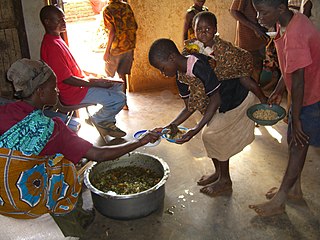
School feeding programs have been defined by the World Bank as "targeted social safety nets that provide both educational and health benefits to the most vulnerable children, thereby increasing enrollment rates, reducing absenteeism, and improving food security at the household level". Beyond improvements in access to food, school feeding programs also have a positive impact on nutritional status, gender equity, and educational status, each of which contributes to improving overall levels of country and human development.

Freerice, originally FreeRice, is a website-based application that allows players to donate rice to families in developing countries by playing a multiple-choice quiz game. For every question the user answers correctly, ten grains of rice are donated via the United Nations World Food Programme. There are over 50 categories, including: English Proverbs, Multiplication Table, German, Flags of the World, and World Heritage Sites. The categories can be played on up to five difficulty levels, from easiest to hardest, depending on the subject. A user's total score is displayed as a mound of rice and the number of grains earned.
Nimdoma Sherpa from Gauri Sankar, Dolakha District is a Nepalese mountain climber. In 2008 she became the youngest woman to climb Mount Everest and in 2009 she joined the Seven Summits Women Team, a team of Nepalese women whose goal is to climb the Seven Summits.
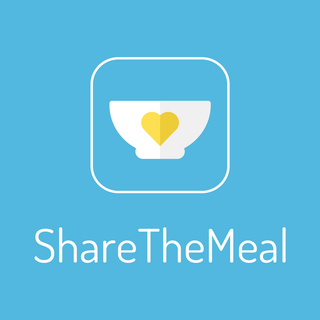
ShareTheMeal is a crowdfunding smartphone application to fight global hunger through the United Nations World Food Programme (WFP). It enables users to make small donations to specific WFP projects and to track its progress. In 2020, ShareTheMeal was selected as one of the "Best Apps" globally by Apple and Google. As of November 2023, ShareTheMeal has over 200 million meals shared from 1.4 million app users.
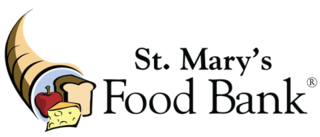
St. Mary's Food Bank Alliance is a nonprofit, nonsectarian organization located in Phoenix, Arizona. Founded in 1967 by John van Hengel, St. Mary's was the first modern organization to operate using the food bank model, which spread throughout U.S. and the rest of the world. Today, St. Mary's is recognized as the world's first food bank.
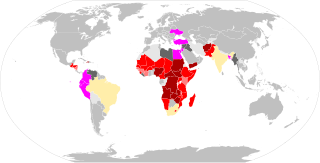
During the COVID-19 pandemic, food insecurity intensified in many places. In the second quarter of 2020, there were multiple warnings of famine later in the year. In an early report, the Nongovernmental Organization (NGO) Oxfam-International talks about "economic devastation" while the lead-author of the UNU-WIDER report compared COVID-19 to a "poverty tsunami". Others talk about "complete destitution", "unprecedented crisis", "natural disaster", "threat of catastrophic global famine". The decision of the WHO on 11 March 2020, to qualify COVID as a pandemic, that is "an epidemic occurring worldwide, or over a very wide area, crossing international boundaries and usually affecting a large number of people" also contributed to building this global-scale disaster narrative.
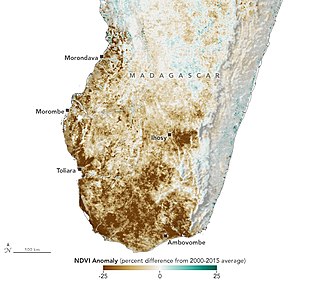
In mid-2021, a severe drought in southern Madagascar caused hundreds of thousands of people, with some estimating more than 1 million people including nearly 460,000 children, to suffer from food insecurity or famine. Some organizations have attributed the situation to the impact of climate change and the handling of the COVID-19 pandemic in the country.















